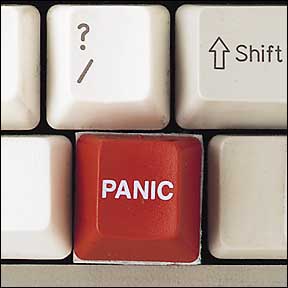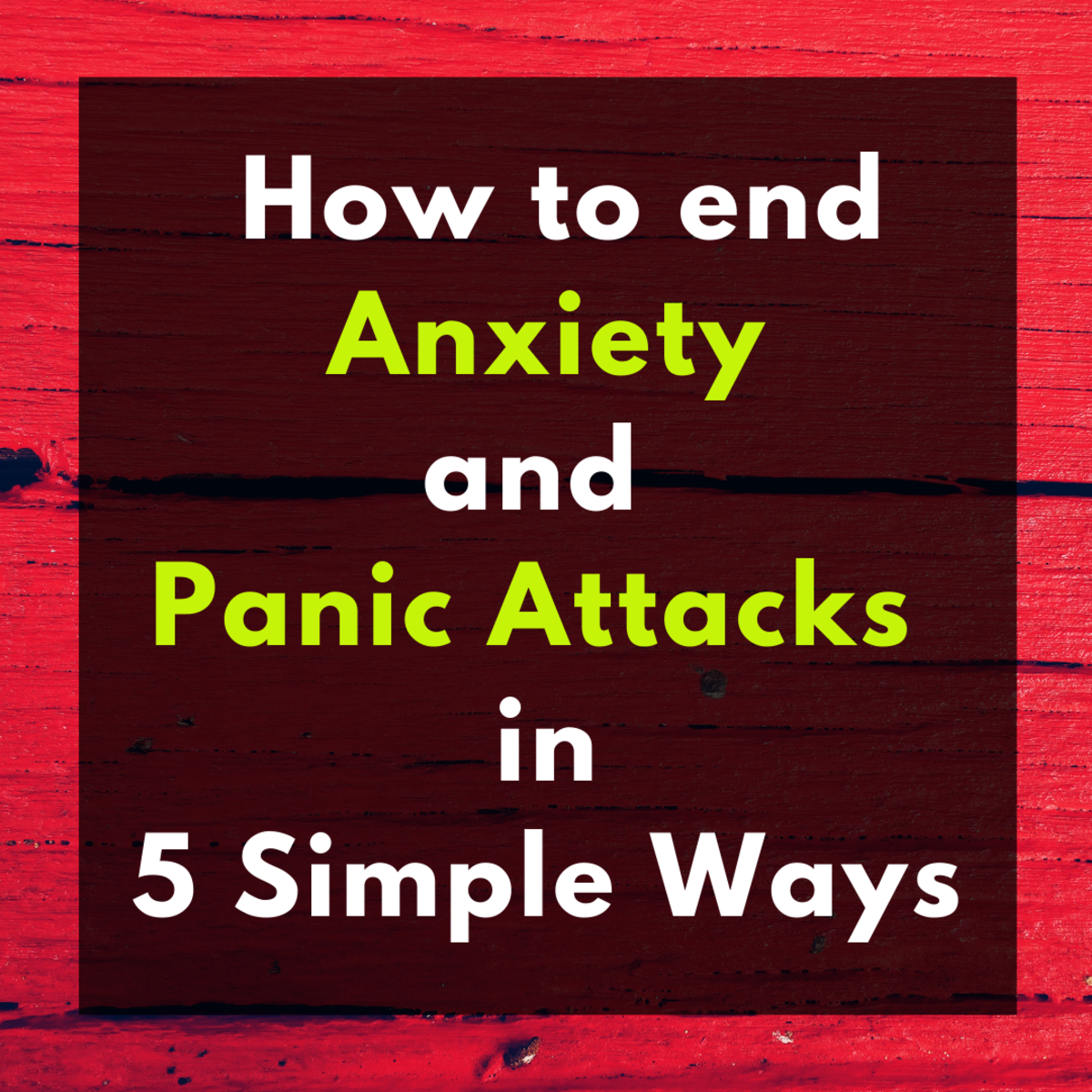- HubPages»
- Health»
- Mental Health»
- Anxiety Disorders
Panic Attacks: How to support a sufferer
As I sat back into the cable car, I could see the lights of the city spread out before me, glittering in the sunset, beautiful and amazing. The little car trundled mechanically forward on its tracks, as it had done each day since it was built over 30 years ago, and then seemed to hesitate slightly on the edge of the girder, before it swung silently out of the docking station and into the void between the struts... suddenly we were over 45 meters above the rooftops, as the droning voice of the guide calmly informed me.
I forget the other commentary details, because at that moment my stomach flipped 360 degrees and seemed to drop towards the incredibly flimsy-seeming steel floorplates, as a dramatic surge of adrenalin flooded my lower body. Preparing to brace myself for an apparently-inevitable impact, my head spun as blood surged to protect my major organs, leaving my extremities singing and white. The 'fight or flight' hormones stirred in my adrenal system, having nowhere to go, then collided and churned hopelessly amongst my cells, provoking nausea, aching and sudden profound tiredness... unable and too terrified to articulate these sensations, I clung white-knuckled to the central strut, and fought to steady my breathing to socially acceptable levels, and avoid throwing up in front of these total strangers. As the cortisol raged through my system, time and attention contracted to a tight focus of self-preservation, as I waited for the trip to be over.
Of course, the cable car didn't crash, it brought us safely down to the base station, and by then my legs recovered function enough to enable a dignified exit. I had enjoyed the unusual view of the city from the air, but above all it dawned on me, I had gained an unusual new insight into my best friend's frequent and horrific experience, of panic attacks.

We are complex higher primates, evolved to cope in an unpredictable world with multiple challenges. Our brains have a number of levels on which this support kicks in, and some of the most basic and primaeval levels are involved when we face a direct threat to our survival. In fact, it is more correct to talk about our whole central nervous system instead of the brain, because some basic reflexes - like the one that slams your foot on the correct pedal when the child runs out in front of your car - bypass the brain entirely and take place at a spinal level.
When faced with a life-or-death situation, the survival-of-the-fittest, reptilian part of the control system takes over, and braces us for a fall, swerves from the crumbling cliff-edge, or ducks from the incoming blow glimpsed in our peripheral vision. To do this the body needs to rapidly reprioritise, diverting blood oxygen and glucose to essentials, and leveraging adrenalin from every cell. This can save our lives, and the lives of others, and is an essential response to a life-threatening situation.
In panic disorder though, these physical responses are triggered unnecessarily, when the organism is not under direct threat. For some sufferers, stimuli are known and predictable - they may be unable to cope in crowds, or with eating in public, or other specifics (what is cause vs effect, and how easy it is to correlate the circumstances of one attack with specific circumstances to then blame or avoid in future... I won't explore here. The connection, once established in the sufferer's mind, is real enough to matter). For others, the triggers are less predictable and they just happen.
When my friend has a panic attack, I can see the physical changes immediately. His face turns white, and he often leaps to his feet abruptly. His hands are clammy, I can hear his heart and breathing accelerate dramatically, as I know he tries to engage the logical part of his brain to repeatedly explain that he is not having a heart attack and not about to die. He can't really speak or follow a conversation, and whilst the attack endures he cannot sit still or be held - nor can he really go anywhere or take definitive action, it is himself that he wants to flee from.
To watch this happen to someone you care about is heartbreaking, even if you know that the symptoms are not physically dangerous (enough tests and ECGs later, and he even believes that himself, between attacks). It's terribly hard to accept that you cannot protect them from their torment, nor can you take it away. So what can you do, to support someone having a panic attack?
- Firstly, be sure that is what you are dealing with. If it's someone you don't know, talk to them calmly about whether this has happened before. If it has not, and you are observing symptoms as described above, you should (discreetly if possible) summon emergency medical assistance. If the sufferer is known to you, has had attacks before, and does not have an underlying complication like asthma or arrythmia, medical help cannot do a lot.
- When you know that it's nothing more nor less than a full-blown panic attack in progress, realise that the person you are dealing with externally is not currently the same as the person you know and love. But that loved one is trapped in there inside, and can hear you and be reassured by you, even if they cannot communicate effectively or they appear to be rejecting or avoiding you.
- You may be able to help with breathing control. If you can get them to look at you, and match your slow and steady breathing, count for them - it's a meditative focus that can be useful. But don't get hung up if it's not working, or frustrations can build on both sides, and messing around with paper bags and so on can be confusing and unhelpful. You just want to help them regain a sense of control, over this aspect of their body.
- Don't try to hold them if they can't handle it... you want to hold a person you love who is in great distress, but being constrained in any way can exacerbate the symptoms and reduce feelings of control further. Stroking their back, massaging the tensed shoulders, or lightly connecting with the back of the hand, can help you be alongside them and near them without trapping or restraining
- Be a gatekeeper: Who they share their symptoms and condition with is their business, and now is not the time to explain to someone new - so field the interruptions virtual or physical, to protect a space around them to let it run its course. Keep kids away, remove social factors from the anxiety concerns.
- Don't say 'it's only a panic attack', or anything similar- you know that is the case, and you want them to know and be reassured by it, but right at this moment what is going on is so all-consuming for them that that will seem patronising and distant and utterly unhelpful. Focus on the future... 'this is happening, it has happened before, breathe it out, it will pass. It will go, and leave you, and you will feel normal and well again. And I will stay with you till you are OK', or words along those lines, are much more helpful
- Ask them what they want you to do - leave them alone/stay with them/hold them/ glass or water /talk to them... they might not know, and there is no point provoking frustrations if they don't, but sometimes it can help to hand back a tiny bit of control to someone who feels it totally lacking in that moment
- Don't expect a response or meaningful conversation. Asking them to describe their symptoms can help up to a point, but don't expect detailed insights or elucidation. Strangely the same applies to afterwards, it's such a state-dependent memory that it seems very unreal to sufferers between bouts, even those crippled by fear of recurrence often have difficulty describing what it's actually like. Our conversation after my cable car adventure brought quite a lot of it out, that had never been articulated before, but could be agreed with in the light of my experience.
- Try to divert... or encourage diversion, into whatever floats their boat. Music, comedy videos, repetitive computer games, anything that superficially engages the conscious mind but doesn't require huge efforts or concentration, can help to pass the time until the attack leaves. That could be minutes, it could be half an hour.
- If you are close to a regular sufferer, try keeping your own diary of attacks, in an attempt to identify triggers. My friend and I don't agree on this aspect, but I feel I have identified patterns, in terms of events and conversations in the 24 hours or so before a major attack. Everyone's situation is unique and distinct, but you can have a role as an observer, that might help to shed some light, especially if a therapeutic intervention is pursued.
- Between attacks, talk about their options. These include medication and a range of therapies, such as cognitive behavioral therapy and hypnotherapy. Because of the state-dependent memory thing mentioned above, it's often difficult for a sufferer to fully appreciate the impact their condition is having on their life, and sometimes a fairly direct intervention is needed to highlight this and make them realize how much they are missing out on through fear of triggering an attack. If they are gently made aware of how their lives have changed, and what the benefits could be of tackling and curing this condition (which cannot be done overnight or without great effort and involvement on their part), then they may be motivated to seek help. Above all, knowing they are loved and supported will help - however helpless you feel watching them suffer, just being there and being involved makes a genuine difference.









